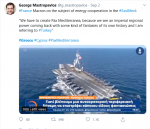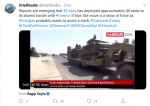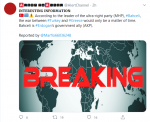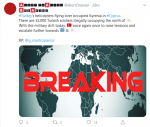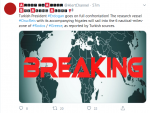You are using an out of date browser. It may not display this or other websites correctly.
You should upgrade or use an alternative browser.
You should upgrade or use an alternative browser.
WAR Regional conflict brewing in the Mediterranean
- Thread starter danielboon
- Start date
-
- Tags
- middle east
northern watch
TB Fanatic
northern watch
TB Fanatic
northern watch
TB Fanatic
northern watch
TB Fanatic
northern watch
TB Fanatic
Hummm..... (Note this is a Turkish source....HC)
Posted for fair use.....
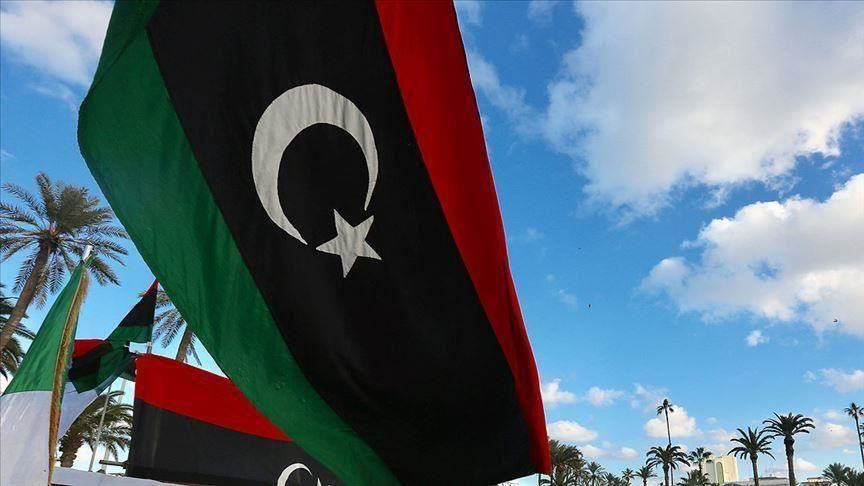
 www.aa.com.tr
www.aa.com.tr
World, Africa
Warlord Haftar again violates Libyan cease-fire
Army reports no casualties following Grad missile attack by Haftar’s militia
Mucahit Aydemir | 06.09.2020
TRIPOLI, Libya
The Libyan army said Sunday that warlord Khalifa Haftar again violated a cease-fire deal and targeted the country’s troops with multiple Grad missiles.
Army sources told Anadolu Agency the warlord’s militia fired 10 missiles at different army posts late Saturday in violation of a cease-fire agreement brokered Aug. 21.
The attack did not cause casualties nor inflict damage on military hardware, said sources.
The army announced Aug. 27 the first breach of the cease-fire by Haftar’s militia, which fired more than one dozen Grad rockets at army positions west of Sirte.
Libya has been torn by civil war since the ouster of late ruler Muammar Gaddafi in 2011.
The Government of National Accord (GNA) was founded in 2015 under a UN-led agreement, but efforts for a long-term political settlement failed due to a military offensive by forces loyal to Haftar.
The UN recognizes Fayez al-Sarraj’s government as the country’s legitimate authority as Tripoli has battled Haftar's militias since April 2019 in a conflict that has claimed thousands of lives.
*Writing by Ali Murat Alhas
Posted for fair use.....

Warlord Haftar again violates Libyan cease-fire
Army reports no casualties following Grad missile attack by Haftar’s militia - Anadolu Ajansı
World, Africa
Warlord Haftar again violates Libyan cease-fire
Army reports no casualties following Grad missile attack by Haftar’s militia
Mucahit Aydemir | 06.09.2020
TRIPOLI, Libya
The Libyan army said Sunday that warlord Khalifa Haftar again violated a cease-fire deal and targeted the country’s troops with multiple Grad missiles.
Army sources told Anadolu Agency the warlord’s militia fired 10 missiles at different army posts late Saturday in violation of a cease-fire agreement brokered Aug. 21.
The attack did not cause casualties nor inflict damage on military hardware, said sources.
The army announced Aug. 27 the first breach of the cease-fire by Haftar’s militia, which fired more than one dozen Grad rockets at army positions west of Sirte.
Libya has been torn by civil war since the ouster of late ruler Muammar Gaddafi in 2011.
The Government of National Accord (GNA) was founded in 2015 under a UN-led agreement, but efforts for a long-term political settlement failed due to a military offensive by forces loyal to Haftar.
The UN recognizes Fayez al-Sarraj’s government as the country’s legitimate authority as Tripoli has battled Haftar's militias since April 2019 in a conflict that has claimed thousands of lives.
*Writing by Ali Murat Alhas
Posted for fair use.....

Turkey Transfers Hundreds of Minors from Syria to Libya
breaking news Hatem Dwidar صدى البلد منذ 9 ساعات تبليغ
Turkey Transfers Hundreds of Minors from Syria to Libya

The Syrian Observatory for Human Rights revealed, on Saturday, that Turkey has transferred about 350 minors from Syria to Libya to fight in the ranks of extremist militias.
The observatory said in a statement that at least 34 of those minors were killed during the ongoing battles in Libya, and their bodies were returned along with about 500 other bodies that were brought back to Syria via Turkey.
The director of the observatory, Rami Abdul-Rahman, added that the regime of Turkish President Recep Tayyip Erdogan was involved in transferring about 19,000 Syrian mercenaries to Libyan lands, in addition to about 10,000 extremists of various nationalities.
On Thursday, Abdul-Rahman said that a new batch of hundreds of mercenaries are currently in training camps in Turkey, waiting for the green light to be transferred to Libya, “in the event of the collapse of the ceasefire and the efforts to calm there.”
He indicated that there are those who are now undergoing military training in Turkey, and they are being prepared to be sent to Libya, in case the ceasefire collapses. The adults numbered about 500, and they know that they are going to fight in Libya if the ceasefire collapses. ”
According to a report issued by the US Africa Command “AFRICOM”, more than 5 thousand Syrian mercenaries were sent by Turkey to Tripoli, during the period between April and June 2020.
لوما نيوز محرك بحث اخبارى و تخلي لوما نيوز مسئوليتها الكاملة عن محتوي الخبر Turkey Transfers Hundreds of Minors from Syria to Libya او الصور وانما تقع المسئولية علي الناشر الاصلي للخبر و المصدر صدى البلد كما يتحمل الناشر الاصلى حقوق النشر و وحقوق الملكية الفكرية للخبر .تم نقل هذا الخبر اوتوماتيكيا وفي حالة امتلاكك للخبر وتريد حذفة او تكذيبة يرجي الرجوع الي المصدر الاصلي للخبر اولا ثم مراسلتنا لحذف الخبر
السابق Historic Handball World Cup Draw: Egypt Clashes with Sweden
التالى Algeria Records 348 New Coronavirus Cases
مواضيع متعلقة

Walla: 10% of Investments in Israeli Market to Arrive From UAE
صدى البلدمنذ 11 دقيقة

أفضل هواتف سامسونج للفئة المتوسطة في البطاريات خلال 2020
صدى البلدمنذ 11 دقيقة

مختار نوح: مرشد الإخوان الجديد يؤيد المثلية والشذوذ الجنسي.. فيديو
صدى البلدمنذ 11 دقيقة

بعد فيديو الخناقة.. رد قوي من كهربا يؤكد التزامه مع الأهلي وجماهيره
صدى البلدمنذ 11 دقيقة

Die heutigen Nachrichten | Die dringenden und wichtigen Nachrichten von heute in Deutschland und allen Ländern der Welt, Moment für Moment, und Nachrichtenentwicklungen ausschließlich von neutralen Autoren
Die heutigen Nachrichten | Die dringenden und wichtigen Nachrichten von heute in Deutschland und allen Ländern der Welt, Moment für Moment, und Nachrichtenentwicklungen ausschließlich von neutralen Autoren
lomazoma.com
Turkey Transfers Hundreds of Minors from Syria to Libya
breaking news Hatem Dwidar صدى البلد منذ 9 ساعات تبليغ
Turkey Transfers Hundreds of Minors from Syria to Libya

The Syrian Observatory for Human Rights revealed, on Saturday, that Turkey has transferred about 350 minors from Syria to Libya to fight in the ranks of extremist militias.
The observatory said in a statement that at least 34 of those minors were killed during the ongoing battles in Libya, and their bodies were returned along with about 500 other bodies that were brought back to Syria via Turkey.
The director of the observatory, Rami Abdul-Rahman, added that the regime of Turkish President Recep Tayyip Erdogan was involved in transferring about 19,000 Syrian mercenaries to Libyan lands, in addition to about 10,000 extremists of various nationalities.
On Thursday, Abdul-Rahman said that a new batch of hundreds of mercenaries are currently in training camps in Turkey, waiting for the green light to be transferred to Libya, “in the event of the collapse of the ceasefire and the efforts to calm there.”
He indicated that there are those who are now undergoing military training in Turkey, and they are being prepared to be sent to Libya, in case the ceasefire collapses. The adults numbered about 500, and they know that they are going to fight in Libya if the ceasefire collapses. ”
According to a report issued by the US Africa Command “AFRICOM”, more than 5 thousand Syrian mercenaries were sent by Turkey to Tripoli, during the period between April and June 2020.
لوما نيوز محرك بحث اخبارى و تخلي لوما نيوز مسئوليتها الكاملة عن محتوي الخبر Turkey Transfers Hundreds of Minors from Syria to Libya او الصور وانما تقع المسئولية علي الناشر الاصلي للخبر و المصدر صدى البلد كما يتحمل الناشر الاصلى حقوق النشر و وحقوق الملكية الفكرية للخبر .تم نقل هذا الخبر اوتوماتيكيا وفي حالة امتلاكك للخبر وتريد حذفة او تكذيبة يرجي الرجوع الي المصدر الاصلي للخبر اولا ثم مراسلتنا لحذف الخبر
السابق Historic Handball World Cup Draw: Egypt Clashes with Sweden
التالى Algeria Records 348 New Coronavirus Cases
مواضيع متعلقة

Walla: 10% of Investments in Israeli Market to Arrive From UAE
صدى البلدمنذ 11 دقيقة

أفضل هواتف سامسونج للفئة المتوسطة في البطاريات خلال 2020
صدى البلدمنذ 11 دقيقة

مختار نوح: مرشد الإخوان الجديد يؤيد المثلية والشذوذ الجنسي.. فيديو
صدى البلدمنذ 11 دقيقة

بعد فيديو الخناقة.. رد قوي من كهربا يؤكد التزامه مع الأهلي وجماهيره
صدى البلدمنذ 11 دقيقة
northern watch
TB Fanatic
northern watch
TB Fanatic
An Albanian-Turkish military cooperation agreement was signed in 1992 that encompassed rebuilding Albania's Pasha Liman Base by Turkey alongside granted access for Turkish use.

Pasha Liman Base - Wikipedia
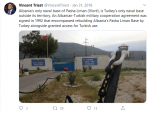
northern watch
TB Fanatic
Posted for fair use

 www.aljazeera.com
www.aljazeera.com
Turkey begins military exercises in Northern Cyprus
France, meanwhile, says sanctions against Ankara are on the table during European Council meeting later this month.
an hour ago
Turkey's armed forces on Sunday began annual exercises in the breakaway republic of Northern Cyprus - an entity recognised only by Ankara - as tensions continue to rise with Greece in the Eastern Mediterranean.
Turkey's hunt for gas and oil reserves in waters claimed by Greece has put a huge strain on the relationship between the two NATO members.
Turkish President Recep Tayyip Erdogan on Saturday raised the stakes by warning Greece: "They will either understand the language of politics and diplomacy, or on the field through bitter experiences."
As tensions run high, the Turkish military began its exercises called "Mediterranean Storm" with the Turkish Cypriot Security Command, Vice President Fuat Oktay said on Twitter.
"The security priorities of our country and the TRNC [Turkish Republic of Northern Cyprus] are indispensable, along with diplomatic solutions in the Eastern Mediterranean," Oktay said.
The Turkish defence ministry also tweeted the military exercises, which last until Thursday, continued "successfully".
Cyprus is divided between the Greek Cypriot-run south - an EU member state - and the Turkish Cypriot north.
Erdogan and European Council President Charles Michel discussed developments in the Eastern Mediterranean on Sunday, CNN Turk reported.
Michel said on Friday that European Union leaders will decide on a "carrot and stick" approach to Turkey when they meet on September 24-25, proposing a conference to defuse tensions.
Turkey sanctions
France said Turkey's escalating conflict with Greece and Cyprus will be the main subject at this month's European Council meeting, when sanctions will be considered against Ankara.
Foreign Minister Jean-Yves Le Drian said he and his counterparts in other EU countries had already discussed "the range of reprisals we could take with regards to Turkey".
Turkey embarked on a military-backed hydrocarbon exploration venture in waters between Greece and Cyprus on August 10, ratcheting up tensions in a strategic corridor of the Eastern Mediterranean.
Greece responded with naval exercises to defend its maritime territory, which were later bolstered by the deployment of French frigates and fighter jets.
'Up to the Turks'
The dispute between NATO members has underscored the rising geopolitical risks in the area as Turkey pursues more aggressively nationalist policies under Erdogan.
The European Union's diplomatic chief Josep Borrell has also raised the possibility of sanctions against Ankara, but so far Paris has been unable to persuade other EU nations to join its hardline response.
Le Drian urged Erdogan to begin talks over its Eastern Mediterranean ambitions between now and the European Council meeting.
"It's up to the Turks to show that this matter ... can be discussed," he told France Inter radio. "If so, we can create a virtuous circle for all the problems on the table."
While he declined to specify the type of sanctions Ankara could face, he said there was an "entire series of measures".
"We are not short of options - and he knows that," said Le Drian referring to Erdogan.

Turkey begins military exercises in northern Cyprus
France, meanwhile, says sanctions against Ankara are on the table during European Council meeting later this month.
Turkey begins military exercises in Northern Cyprus
France, meanwhile, says sanctions against Ankara are on the table during European Council meeting later this month.
an hour ago
Turkey's armed forces on Sunday began annual exercises in the breakaway republic of Northern Cyprus - an entity recognised only by Ankara - as tensions continue to rise with Greece in the Eastern Mediterranean.
Turkey's hunt for gas and oil reserves in waters claimed by Greece has put a huge strain on the relationship between the two NATO members.
Turkish President Recep Tayyip Erdogan on Saturday raised the stakes by warning Greece: "They will either understand the language of politics and diplomacy, or on the field through bitter experiences."
As tensions run high, the Turkish military began its exercises called "Mediterranean Storm" with the Turkish Cypriot Security Command, Vice President Fuat Oktay said on Twitter.
"The security priorities of our country and the TRNC [Turkish Republic of Northern Cyprus] are indispensable, along with diplomatic solutions in the Eastern Mediterranean," Oktay said.
The Turkish defence ministry also tweeted the military exercises, which last until Thursday, continued "successfully".
Cyprus is divided between the Greek Cypriot-run south - an EU member state - and the Turkish Cypriot north.
Erdogan and European Council President Charles Michel discussed developments in the Eastern Mediterranean on Sunday, CNN Turk reported.
Michel said on Friday that European Union leaders will decide on a "carrot and stick" approach to Turkey when they meet on September 24-25, proposing a conference to defuse tensions.
Turkey sanctions
France said Turkey's escalating conflict with Greece and Cyprus will be the main subject at this month's European Council meeting, when sanctions will be considered against Ankara.
Foreign Minister Jean-Yves Le Drian said he and his counterparts in other EU countries had already discussed "the range of reprisals we could take with regards to Turkey".
Turkey embarked on a military-backed hydrocarbon exploration venture in waters between Greece and Cyprus on August 10, ratcheting up tensions in a strategic corridor of the Eastern Mediterranean.
Greece responded with naval exercises to defend its maritime territory, which were later bolstered by the deployment of French frigates and fighter jets.
'Up to the Turks'
The dispute between NATO members has underscored the rising geopolitical risks in the area as Turkey pursues more aggressively nationalist policies under Erdogan.
The European Union's diplomatic chief Josep Borrell has also raised the possibility of sanctions against Ankara, but so far Paris has been unable to persuade other EU nations to join its hardline response.
Le Drian urged Erdogan to begin talks over its Eastern Mediterranean ambitions between now and the European Council meeting.
"It's up to the Turks to show that this matter ... can be discussed," he told France Inter radio. "If so, we can create a virtuous circle for all the problems on the table."
While he declined to specify the type of sanctions Ankara could face, he said there was an "entire series of measures".
"We are not short of options - and he knows that," said Le Drian referring to Erdogan.
Posted for fair use.....

 www.voanews.com
www.voanews.com
Greece Beefs up Patrols Along Borders with Turkey
By Anthee Carassava
September 06, 2020 12:29 PM
ATHENS - Greece is beefing up land patrols to stem a rising tide of illegal migrants trickling in from neighboring Turkey. With tensions between the two NATO allies at their highest in years, Athens fears Ankara may move to weaponize refugees, sparking a fresh migration crisis on top of a lingering energy dispute.
Greek authorities say they are mobilizing scores of special border guards to scour sprawling fields and marshland along the Evros region that divides Greece and Turkey.
Hundreds more will also be deployed on Greece’s Aegean islands to stop illegal sea crossings.
United Nations statistics show that illegal land entries into Greece from Turkey, have doubled in the last month alone, stoking concerns of a new migration crisis as tensions between the feuding countries have flared over energy rights in eastern Mediterranean Sea.
Migration Minister Notis Mitarachis explains the Greek position.
"We want Turkey to conform to agreements it has signed to stem the flow of illegal immigration," he said. "Any attempt to weaponize the suffering of refugees for geopolitical interests will not be tolerated."
Greece fended off a major migration push from Turkey earlier this year after Turkish President Recep Tayyip Erdogan temporarily lifted his country’s border controls, allowing refugees and migrants to make their way freely into Europe.
Greece claimed to have thwarted what it called “an enemy invasion” of hundreds of thousands of asylum seekers into the country earlier this year and has kept its defenses on alert in the Evros region since then.

The border reinforcement also comes amid a flurry of media reports saying that Turkey was withdrawing 40 tanks from Syria, moving them instead to the Greek-Turkish border.
Turkey has not explained the deployment but Kostas Lavdas, a professor of international relations at Panteon University in Athens, says Greece must be ready for war.
It may be a simple rotation of forces, he said, because Turkey has several military fronts open. Regardless the reason, he said, Turkey has repeatedly shown that it wants to be ready for all scenarios relating to Greece, including war.
Greece, he said, may want to avoid that but it also needs to be prepared for it.
Relations between the two countries have deteriorated dangerously in the past month as Turkey has sent an exploration ship near a cluster of Greek islands, to hunt for undersea oil and gas in a patch of the eastern Mediterranean which Athens says only it has the right to survey.
Turkey rejects the claims, saying islands are not entitled to what is known as an exclusive economic zone …. Ankara instead believes it has the right to explore the oil and mineral rich East Mediterranean seabed after a recent maritime agreement it concluded with Libya.
Erdogan has agreed to engage in talks with Greece to over decades-old differences over air and sea rights but said this weekend he would do anything to defend his country’s interests.
He said, either Athens will heed to diplomacy or it will re-live bitter memories of war.
Greece has sought recourse with the United Nations, submitting what it called a bulky dossier of alleged violations by Turkey in recent weeks. The United Nations has made no response.
Related Stories

Europe
Erdogan Raises Rhetoric in Greece Standoff in Mediterranean
Ankara is currently facing off with Athens over oil and gas exploration rights in the eastern Mediterranean

By Associated Press
Sat, 09/05/2020 - 12:07 PM

Europe
Greece Rejects NATO Bid to De-Escalate Tensions With Turkey
Athens says it will not be bullied into talks with Ankara over undersea oil and gas exploration rights in eastern Mediterranean

By Anthee Carassava
Fri, 09/04/2020 - 11:37 AM

Europe
NATO Announces Talks as Turkey-Greece Tensions Rise
Turkey starts naval exercise in Mediterranean waters contested with Greece as conflict fears grow

By Dorian Jones
Thu, 09/03/2020 - 10:24 PM

Europe
Refugees Abandoned at Sea Between Turkey and Greece
Refugees attempting to travel to Europe from Turkey say they increasingly face expulsion, robbery or being abandoned on rubber boats

By Heather Murdock
Wed, 09/02/2020 - 02:05 PM

Greece Beefs up Patrols Along Borders with Turkey
Athens fears Ankara may move to weaponize refugees, sparking fresh migration crisis on top of lingering energy dispute
 www.voanews.com
www.voanews.com
Greece Beefs up Patrols Along Borders with Turkey
By Anthee Carassava
September 06, 2020 12:29 PM
ATHENS - Greece is beefing up land patrols to stem a rising tide of illegal migrants trickling in from neighboring Turkey. With tensions between the two NATO allies at their highest in years, Athens fears Ankara may move to weaponize refugees, sparking a fresh migration crisis on top of a lingering energy dispute.
Greek authorities say they are mobilizing scores of special border guards to scour sprawling fields and marshland along the Evros region that divides Greece and Turkey.
Hundreds more will also be deployed on Greece’s Aegean islands to stop illegal sea crossings.
United Nations statistics show that illegal land entries into Greece from Turkey, have doubled in the last month alone, stoking concerns of a new migration crisis as tensions between the feuding countries have flared over energy rights in eastern Mediterranean Sea.
Migration Minister Notis Mitarachis explains the Greek position.
"We want Turkey to conform to agreements it has signed to stem the flow of illegal immigration," he said. "Any attempt to weaponize the suffering of refugees for geopolitical interests will not be tolerated."
Greece fended off a major migration push from Turkey earlier this year after Turkish President Recep Tayyip Erdogan temporarily lifted his country’s border controls, allowing refugees and migrants to make their way freely into Europe.
Greece claimed to have thwarted what it called “an enemy invasion” of hundreds of thousands of asylum seekers into the country earlier this year and has kept its defenses on alert in the Evros region since then.

The border reinforcement also comes amid a flurry of media reports saying that Turkey was withdrawing 40 tanks from Syria, moving them instead to the Greek-Turkish border.
Turkey has not explained the deployment but Kostas Lavdas, a professor of international relations at Panteon University in Athens, says Greece must be ready for war.
It may be a simple rotation of forces, he said, because Turkey has several military fronts open. Regardless the reason, he said, Turkey has repeatedly shown that it wants to be ready for all scenarios relating to Greece, including war.
Greece, he said, may want to avoid that but it also needs to be prepared for it.
Relations between the two countries have deteriorated dangerously in the past month as Turkey has sent an exploration ship near a cluster of Greek islands, to hunt for undersea oil and gas in a patch of the eastern Mediterranean which Athens says only it has the right to survey.
Turkey rejects the claims, saying islands are not entitled to what is known as an exclusive economic zone …. Ankara instead believes it has the right to explore the oil and mineral rich East Mediterranean seabed after a recent maritime agreement it concluded with Libya.
Erdogan has agreed to engage in talks with Greece to over decades-old differences over air and sea rights but said this weekend he would do anything to defend his country’s interests.
He said, either Athens will heed to diplomacy or it will re-live bitter memories of war.
Greece has sought recourse with the United Nations, submitting what it called a bulky dossier of alleged violations by Turkey in recent weeks. The United Nations has made no response.
Related Stories

Europe
Erdogan Raises Rhetoric in Greece Standoff in Mediterranean
Ankara is currently facing off with Athens over oil and gas exploration rights in the eastern Mediterranean

By Associated Press
Sat, 09/05/2020 - 12:07 PM
Europe
Greece Rejects NATO Bid to De-Escalate Tensions With Turkey
Athens says it will not be bullied into talks with Ankara over undersea oil and gas exploration rights in eastern Mediterranean

By Anthee Carassava
Fri, 09/04/2020 - 11:37 AM

Europe
NATO Announces Talks as Turkey-Greece Tensions Rise
Turkey starts naval exercise in Mediterranean waters contested with Greece as conflict fears grow

By Dorian Jones
Thu, 09/03/2020 - 10:24 PM
Europe
Refugees Abandoned at Sea Between Turkey and Greece
Refugees attempting to travel to Europe from Turkey say they increasingly face expulsion, robbery or being abandoned on rubber boats

By Heather Murdock
Wed, 09/02/2020 - 02:05 PM
Posted for fair use.....
 www.macaubusiness.com
www.macaubusiness.com
September 7, 2020
Turkey sanctions on table for EU meeting, France says
By AFP
Turkey’s escalating conflict with Greece and Cyprus will be the main subject at this month’s European Council meeting, when sanctions will be considered against Ankara, France said on Sunday.
Foreign Minister Jean-Yves Le Drian said he and his counterparts in other EU countries had already discussed “the range of reprisals we could take with regards to Turkey”.
Turkey embarked on a military-backed hydrocarbon exploration venture in waters between Greece and Cyprus on August 10, ratcheting up tensions in a strategic corridor of the eastern Mediterranean.
Greece responded with naval exercises to defend its maritime territory, which were later bolstered by the deployment of French frigates and fighter jets.
The dispute between NATO members has underscored the rising geopolitical risks in the area as Turkey pursues more aggressively nationalist policies under President Recep Tayyip Erdogan.
The European Union’s diplomatic chief Josep Borrell has also raised the possibility of sanctions against Ankara but so far Paris has been unable to persuade other EU nations to join its hardline response.
Le Drian urged Erdogan to begin talks over its Eastern Mediterranean ambitions between now and the European Council meeting.
“It’s up to the Turks to show that this matter… can be discussed,” he told France Inter radio. “If so, we can create a virtuous circle for all the problems on the table.”
While he declined to specify the type of sanctions Ankara could face, he said there was an “entire series of measures”.
“We are not short of options, and he knows that,” said Le Drian referring to Erdogan.
The European Council meeting is set to meet on September 24 and 25.
Turkey sanctions on table for EU meeting, France says | Macau Business
Turkey's escalating conflict with Greece and Cyprus will be the main subject at this month's European Council meeting...
 www.macaubusiness.com
www.macaubusiness.com
September 7, 2020
Turkey sanctions on table for EU meeting, France says
By AFP
Turkey’s escalating conflict with Greece and Cyprus will be the main subject at this month’s European Council meeting, when sanctions will be considered against Ankara, France said on Sunday.
Foreign Minister Jean-Yves Le Drian said he and his counterparts in other EU countries had already discussed “the range of reprisals we could take with regards to Turkey”.
Turkey embarked on a military-backed hydrocarbon exploration venture in waters between Greece and Cyprus on August 10, ratcheting up tensions in a strategic corridor of the eastern Mediterranean.
Greece responded with naval exercises to defend its maritime territory, which were later bolstered by the deployment of French frigates and fighter jets.
The dispute between NATO members has underscored the rising geopolitical risks in the area as Turkey pursues more aggressively nationalist policies under President Recep Tayyip Erdogan.
The European Union’s diplomatic chief Josep Borrell has also raised the possibility of sanctions against Ankara but so far Paris has been unable to persuade other EU nations to join its hardline response.
Le Drian urged Erdogan to begin talks over its Eastern Mediterranean ambitions between now and the European Council meeting.
“It’s up to the Turks to show that this matter… can be discussed,” he told France Inter radio. “If so, we can create a virtuous circle for all the problems on the table.”
While he declined to specify the type of sanctions Ankara could face, he said there was an “entire series of measures”.
“We are not short of options, and he knows that,” said Le Drian referring to Erdogan.
The European Council meeting is set to meet on September 24 and 25.
jward
passin' thru
..rather feels like a game of musical chairs in a wax museum to me- you know everyone is shifting but can only catch glimpses of the movement out of the corner of your eye
TurkishFacts4u
@TurkishFacts4U
1m
Sources tell me that Turkey is to immediately begin accession negotiations with the Shanghai Cooperation Organisation (SCO) the moment the European Union imposes French led sanctions on #Turkey. This is getting further and further interesting. The global balance of power shifting

TurkishFacts4u
@TurkishFacts4
43s
Replying to
@TurkishFacts4U
50 years down the track (if the EU still exists then) #EU policy makers will repeatedly ask themselves how did we become neighbors with a nuclear armed Turkey aligned with China/Russia.

TurkishFacts4u
@TurkishFacts4U
1m
Sources tell me that Turkey is to immediately begin accession negotiations with the Shanghai Cooperation Organisation (SCO) the moment the European Union imposes French led sanctions on #Turkey. This is getting further and further interesting. The global balance of power shifting

TurkishFacts4u
@TurkishFacts4
43s
Replying to
@TurkishFacts4U
50 years down the track (if the EU still exists then) #EU policy makers will repeatedly ask themselves how did we become neighbors with a nuclear armed Turkey aligned with China/Russia.
jward
passin' thru

TurkishFacts4u
@TurkishFacts4U
14m
Mass media/Twitter- Turkish Economy is in tatters, Greeks are doing amazing. But if you ignore all the perception management & look deeper Turkey is in a much better position than many. Just compare Government Debt to GDP. Turkey- 33.1%, Greece 176.6%
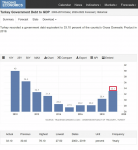
northern watch
TB Fanatic
jward
passin' thru
That's the analysis others are putting forth too- I really really really need to turn my 30' hall into a chalk board in order to keep up with all of this!View attachment 219104
This was originally posted by jward
IMO it represents a major shift for Turkey, away from the EU which did not want the country in the first place to an Asian block.
jward
passin' thru
Turkey’s Muscle Flexing in the Med Isn’t Just About Gas
President Recep Tayyip Erdogan is building a navy capable of asserting his nation’s interests as a regional power.
By
Marc Champion
September 6, 2020, 11:00 PM CDT

Turkey’s Oruc Reis seismic research vessel, which searches for hydrocarbon, oil, natural gas and coal reserves at sea.
Photographer: Ozan Kose/AFP via Getty Images
Sailing through the Bosporus Strait that divides Europe from Asia last year, a Turkish fleet saluted the tomb of 16th century pirate and admiral Barbarossa, reviving a tradition that harks back to when the Ottoman Empire ruled the Mediterranean Sea.
Little noticed abroad, the tribute by sailors returning from the country’s largest-ever naval exercise now appears freighted with symbolism. As Turkey rebuilds its maritime might and contests disputed waters, it is once more in conflict with historic adversaries to the West.
International attention has focused on the race for offshore natural gas deposits in the Eastern Mediterranean that prompted not just Turkey, but also Cyprus, Egypt, Greece and Israel to claim rights in one of the world’s most crowded seas. Yet the roots of the tensions run deeper.
The growth of the navy reveals the scale—often dismissed outside Turkey— of President Recep Tayyip Erdogan’s ambition to assert his nation’s interests as a specifically Muslim regional power, able to go toe-to-toe with Europe, Russia and the U.S.

A Turkish navy vessel sails through the Bosporus on May 25, 2019.
Photographer: Isa Terli/Anadolu Agency via Getty Images
Augmented by new domestically produced surface ships and submarines, the navy has already helped Erdogan to project force abroad with a success that has surprised and alarmed other littoral states. Larger frigates are in the pipeline, and a 27,000 ton light aircraft carrier is due by next year.
“Not far below the surface is a much more emotive set of issues, the idea that Turkey is the greatest power in the Eastern Mediterranean and should be treated as such,” said Ryan Gingeras, professor in the Department of National Security Affairs at the Naval Postgraduate School in California and a specialist in Turkish maritime affairs. “It perceives itself as surrounded by rivals and adversaries and it will use strength to assert itself, because it can.”
QuicktakeMapping the Turkish Military’s Expanding Footprint
The boom around Turkey’s naval shipyards is part of a wider expansion of the domestic arms industry—from warships, to attack helicopters, to armed drones—aimed at gaining what Turkish officials call “strategic independence” from Western suppliers, now seen more as rivals than partners.
Erdogan has set a target of 2023, the 100th anniversary of the Republic, for Turkey to provide all of its own weaponry. That’s unlikely to be met. There are also reasons to doubt whether a troubled $750 billion economy can sustain his great power ambitions in the current climate. The European Union is also threatening sanctions over Turkey’s activities in the region.

Still, Turkey’s military has forced its way into Northern Syria, ensuring a seat at the table in developments there. In Libya, Turkish warships helped supply and support the besieged government in Tripoli, turning the tide of civil war in its favor.
Turkish naval flotillas also now routinely escort seismic research vessels into Greek and Cypriot-claimed waters as they explore for gas. Last month, that resulted in a collision with a Greek naval vessel as animosity between the two NATO members reached its highest point since a 1996 standoff over a pair of uninhabited Aegean islets that almost saw them go to war.
“Turkey will get its fair share in the Mediterranean, Aegean and Black Sea,” Erdogan said in a speech on Aug. 26 to commemorate the first Seljuk Turk defeat of the Greek, Byzantine Empire, at the battle of Manzikert in 1071. “If we say we will do something, we will do it, and we will pay the price,” he added, daring any nation to stand in the way.

Erdogan attends a ceremony marking the 949th anniversary of the Battle of Manzikert, in Mus, Turkey, on Aug. 26.
Photographer: Ozkan Bilgin/Anadolu Agency via Getty Images
A few days later, he marked another military victory over Greece, in 1922, by celebrating the production of Turkey’s first ship-launched cruise missile, as well as “space trials” for a liquid-propelled rocket. And on Saturday, he appeared to threaten Greece directly, warning it would suffer “in the field” if it didn’t reach a diplomatic settlement.
Just how literally to take Erdogan’s belligerence is unclear. In a recent Bloomberg News interview, his spokesman and adviser, Ibrahim Kalin, said Turkey aimed to pressure Mediterranean partners to consider and negotiate Turkish interests in the region that had for too long been ignored.
Greece says that islands must be taken into account in delineating a country’s continental shelf, in line with the UN Law of the Sea, which Turkey has not signed. Ankara argues that a country’s continental shelf should be measured from its mainland. Both sides have offered to sit down for talks, though there’s little prospect of that happening anytime soon.
Turkey’s forceful approach is getting attention from other Mediterranean powers, but it has also left the nation of 83 million looking isolated.
Last week, a Turkish navy website expressed concern at Russian plans to hold live-fire exercises in the Mediterranean later this month. The U.S. partially lifted a decades-long arms embargo on Cyprus, divided since Turkey invaded the north in 1974 ostensibly to protect ethnic Turks. In a show of force, France briefly flew high-powered Rafale jets to an airbase on the Greek-speaking side of the island.
Disputed Waters
Competing claims over the Eastern Mediterranean
Sources: Turkey’s Ministry of Foreign Affairs; Anadolu Agency; Greek government; Flanders Marine Institute
Note: Some Exclusive Economic Zones are disputed
Erdogan’s nationalist approach has broad political appeal, in a nation polarized between supporters of his brand of religious conservatism and of the secularism promoted by the Republic’s founder, Mustafa Kemal Ataturk.
“I’m a Kemalist, I’m totally against using Islam in politics,” said Cem Gurdeniz, a retired admiral and former director of policy planning for the Turkish navy. Yet he shares Erdogan’s belief that core interests of the U.S. and Western Europe are now opposed to those of Turkey.
In 2006, Gurdeniz produced the idea of an expansive “Blue Homeland” in the waters that surround Turkey, which has since been taken up by the state. He describes that vision as a call to defend Turkey’s maritime rights, made in response to Greece’s stance. He ridiculed the idea that offshore islands should supersede mainland claims to as many as 150,000 square kilometers (58,000 square miles) of continental shelf.
“Their mindset is so simple: We left Anatolia after defeat in 1923, but we kept the Aegean Sea,” he said. “They think the Turks are a land people, so at sea they can take whatever they want. No, things have changed.”
Based on current construction plans, Turkey’s navy will soon outweigh its primary Greek competitor, long considered the stronger power at sea. A spokesman for the Greek Navy said neither the Defense Ministry nor the Navy would comment for this article.

A Greek navy patrol boat sails off the Greek island of Kastellorizo, near the Turkish mainland on Aug. 28.
Photographer: Louisa Gouliamaki/AFP via Getty Images
None of this makes war between the two countries inevitable or even probable, but escalation risks are rising, according to Hugo Decis, a research analyst focused on naval affairs at the International Institute for Strategic Studies, a London-based security think tank.
“What we should be really worry about is the development of a dynamic of fait accompli, where Turkey starts to take the same kinds of steps as China,” Decis said, referring to the militarization of reclaimed reefs in the South China Sea.
Last year’s massive naval exercise was itself called “Blue Homeland.” As the fleet honored Barbarossa, few personalities could have better reflected the growing rift in perceptions between Turkey and the West.
Remembered in Europe as a slave trader who ravaged the Mediterranean’s northern coastlines, Barbaros Hayreddin Pasha is revered at home as a brilliant naval commander who, in 1538, defeated a combined fleet of Christian powers. For a brief three decades, he turned the sea into an Ottoman lake.
“This is not an issue of Turkey’s internal politics,” Gurdeniz said of Turkey’s Mediterranean demands. “These are disputes that won’t go away, even if the government changes.”
— With assistance by Cagan Koc, Selcan Hacaoglu, Sotiris Nikas, and Paul Tugwell
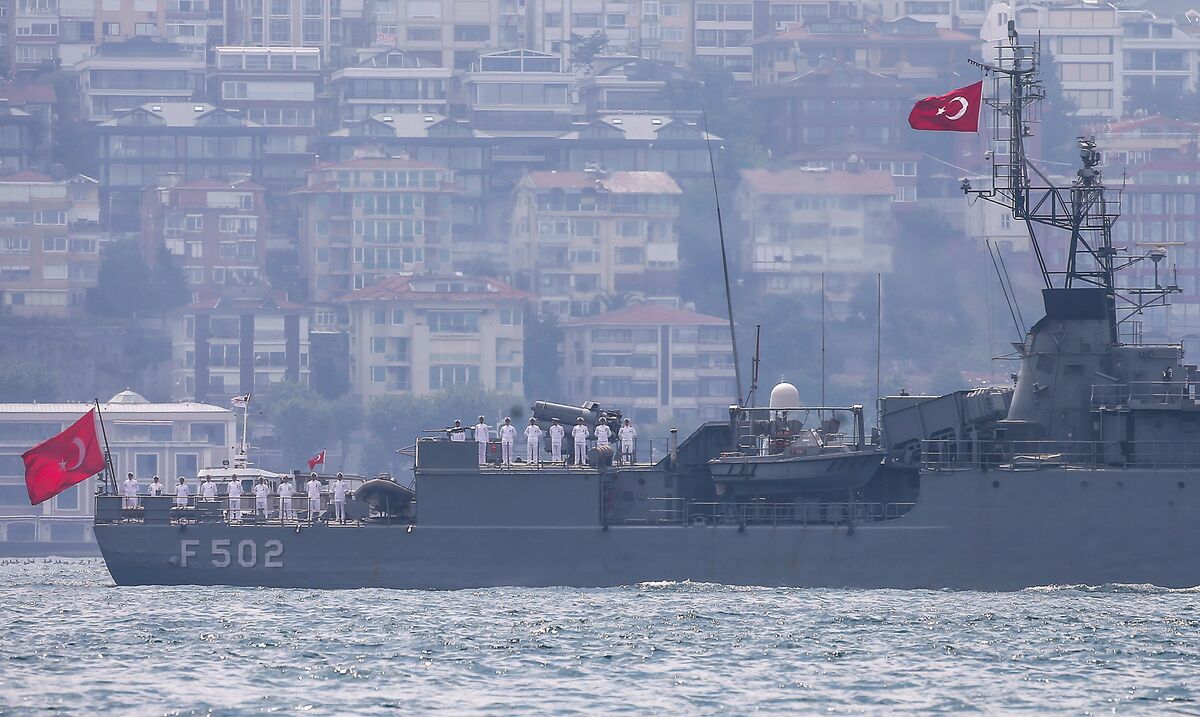
 www.bloomberg.com
www.bloomberg.com
President Recep Tayyip Erdogan is building a navy capable of asserting his nation’s interests as a regional power.
By
Marc Champion
September 6, 2020, 11:00 PM CDT

Turkey’s Oruc Reis seismic research vessel, which searches for hydrocarbon, oil, natural gas and coal reserves at sea.
Photographer: Ozan Kose/AFP via Getty Images
Sailing through the Bosporus Strait that divides Europe from Asia last year, a Turkish fleet saluted the tomb of 16th century pirate and admiral Barbarossa, reviving a tradition that harks back to when the Ottoman Empire ruled the Mediterranean Sea.
Little noticed abroad, the tribute by sailors returning from the country’s largest-ever naval exercise now appears freighted with symbolism. As Turkey rebuilds its maritime might and contests disputed waters, it is once more in conflict with historic adversaries to the West.
International attention has focused on the race for offshore natural gas deposits in the Eastern Mediterranean that prompted not just Turkey, but also Cyprus, Egypt, Greece and Israel to claim rights in one of the world’s most crowded seas. Yet the roots of the tensions run deeper.
The growth of the navy reveals the scale—often dismissed outside Turkey— of President Recep Tayyip Erdogan’s ambition to assert his nation’s interests as a specifically Muslim regional power, able to go toe-to-toe with Europe, Russia and the U.S.

A Turkish navy vessel sails through the Bosporus on May 25, 2019.
Photographer: Isa Terli/Anadolu Agency via Getty Images
Augmented by new domestically produced surface ships and submarines, the navy has already helped Erdogan to project force abroad with a success that has surprised and alarmed other littoral states. Larger frigates are in the pipeline, and a 27,000 ton light aircraft carrier is due by next year.
“Not far below the surface is a much more emotive set of issues, the idea that Turkey is the greatest power in the Eastern Mediterranean and should be treated as such,” said Ryan Gingeras, professor in the Department of National Security Affairs at the Naval Postgraduate School in California and a specialist in Turkish maritime affairs. “It perceives itself as surrounded by rivals and adversaries and it will use strength to assert itself, because it can.”
QuicktakeMapping the Turkish Military’s Expanding Footprint
The boom around Turkey’s naval shipyards is part of a wider expansion of the domestic arms industry—from warships, to attack helicopters, to armed drones—aimed at gaining what Turkish officials call “strategic independence” from Western suppliers, now seen more as rivals than partners.
Erdogan has set a target of 2023, the 100th anniversary of the Republic, for Turkey to provide all of its own weaponry. That’s unlikely to be met. There are also reasons to doubt whether a troubled $750 billion economy can sustain his great power ambitions in the current climate. The European Union is also threatening sanctions over Turkey’s activities in the region.

Still, Turkey’s military has forced its way into Northern Syria, ensuring a seat at the table in developments there. In Libya, Turkish warships helped supply and support the besieged government in Tripoli, turning the tide of civil war in its favor.
Turkish naval flotillas also now routinely escort seismic research vessels into Greek and Cypriot-claimed waters as they explore for gas. Last month, that resulted in a collision with a Greek naval vessel as animosity between the two NATO members reached its highest point since a 1996 standoff over a pair of uninhabited Aegean islets that almost saw them go to war.
“Turkey will get its fair share in the Mediterranean, Aegean and Black Sea,” Erdogan said in a speech on Aug. 26 to commemorate the first Seljuk Turk defeat of the Greek, Byzantine Empire, at the battle of Manzikert in 1071. “If we say we will do something, we will do it, and we will pay the price,” he added, daring any nation to stand in the way.

Erdogan attends a ceremony marking the 949th anniversary of the Battle of Manzikert, in Mus, Turkey, on Aug. 26.
Photographer: Ozkan Bilgin/Anadolu Agency via Getty Images
A few days later, he marked another military victory over Greece, in 1922, by celebrating the production of Turkey’s first ship-launched cruise missile, as well as “space trials” for a liquid-propelled rocket. And on Saturday, he appeared to threaten Greece directly, warning it would suffer “in the field” if it didn’t reach a diplomatic settlement.
Just how literally to take Erdogan’s belligerence is unclear. In a recent Bloomberg News interview, his spokesman and adviser, Ibrahim Kalin, said Turkey aimed to pressure Mediterranean partners to consider and negotiate Turkish interests in the region that had for too long been ignored.
Greece says that islands must be taken into account in delineating a country’s continental shelf, in line with the UN Law of the Sea, which Turkey has not signed. Ankara argues that a country’s continental shelf should be measured from its mainland. Both sides have offered to sit down for talks, though there’s little prospect of that happening anytime soon.
Turkey’s forceful approach is getting attention from other Mediterranean powers, but it has also left the nation of 83 million looking isolated.
Last week, a Turkish navy website expressed concern at Russian plans to hold live-fire exercises in the Mediterranean later this month. The U.S. partially lifted a decades-long arms embargo on Cyprus, divided since Turkey invaded the north in 1974 ostensibly to protect ethnic Turks. In a show of force, France briefly flew high-powered Rafale jets to an airbase on the Greek-speaking side of the island.
Disputed Waters
Competing claims over the Eastern Mediterranean
Sources: Turkey’s Ministry of Foreign Affairs; Anadolu Agency; Greek government; Flanders Marine Institute
Note: Some Exclusive Economic Zones are disputed
Erdogan’s nationalist approach has broad political appeal, in a nation polarized between supporters of his brand of religious conservatism and of the secularism promoted by the Republic’s founder, Mustafa Kemal Ataturk.
“I’m a Kemalist, I’m totally against using Islam in politics,” said Cem Gurdeniz, a retired admiral and former director of policy planning for the Turkish navy. Yet he shares Erdogan’s belief that core interests of the U.S. and Western Europe are now opposed to those of Turkey.
In 2006, Gurdeniz produced the idea of an expansive “Blue Homeland” in the waters that surround Turkey, which has since been taken up by the state. He describes that vision as a call to defend Turkey’s maritime rights, made in response to Greece’s stance. He ridiculed the idea that offshore islands should supersede mainland claims to as many as 150,000 square kilometers (58,000 square miles) of continental shelf.
“Their mindset is so simple: We left Anatolia after defeat in 1923, but we kept the Aegean Sea,” he said. “They think the Turks are a land people, so at sea they can take whatever they want. No, things have changed.”
Based on current construction plans, Turkey’s navy will soon outweigh its primary Greek competitor, long considered the stronger power at sea. A spokesman for the Greek Navy said neither the Defense Ministry nor the Navy would comment for this article.

A Greek navy patrol boat sails off the Greek island of Kastellorizo, near the Turkish mainland on Aug. 28.
Photographer: Louisa Gouliamaki/AFP via Getty Images
None of this makes war between the two countries inevitable or even probable, but escalation risks are rising, according to Hugo Decis, a research analyst focused on naval affairs at the International Institute for Strategic Studies, a London-based security think tank.
“What we should be really worry about is the development of a dynamic of fait accompli, where Turkey starts to take the same kinds of steps as China,” Decis said, referring to the militarization of reclaimed reefs in the South China Sea.
Last year’s massive naval exercise was itself called “Blue Homeland.” As the fleet honored Barbarossa, few personalities could have better reflected the growing rift in perceptions between Turkey and the West.
Remembered in Europe as a slave trader who ravaged the Mediterranean’s northern coastlines, Barbaros Hayreddin Pasha is revered at home as a brilliant naval commander who, in 1538, defeated a combined fleet of Christian powers. For a brief three decades, he turned the sea into an Ottoman lake.
“This is not an issue of Turkey’s internal politics,” Gurdeniz said of Turkey’s Mediterranean demands. “These are disputes that won’t go away, even if the government changes.”
— With assistance by Cagan Koc, Selcan Hacaoglu, Sotiris Nikas, and Paul Tugwell

Turkey’s Muscle Flexing in the Mediterranean Isn’t Just About Gas
President Recep Tayyip Erdogan is building a navy capable of asserting his nation’s interests as a regional power.
Last edited:
jward
passin' thru
TurkishFacts4u
@TurkishFacts4U
13m
The Turkish Navy's primary indigenous sea-denial asset: Roketsan ATMACA. Mobile batteries placed within the safety of the Turkish mainland alone is sufficient to destroy Greek Frigates at home port & in the Aegean Sea.

@TurkishFacts4U
13m
The Turkish Navy's primary indigenous sea-denial asset: Roketsan ATMACA. Mobile batteries placed within the safety of the Turkish mainland alone is sufficient to destroy Greek Frigates at home port & in the Aegean Sea.

jward
passin' thru
EndGameWW3
@EndGameWW3
8m
Update Key Date to look for: If Erdogan extends the Oruc Reis survey vessel past September 12th when the NAVTEX is set to expire then Erdogan has chosen the path of conflict with Greece.
jward
passin' thru
FJ
@Natsecjeff
16h
VIDEO purportedly shows airstrikes against Iran-backed Houthi militants by Saudi-led Coalition in Saadah, #Yemen.
View: https://twitter.com/Natsecjeff/status/1302690530799824904?s=20
@Natsecjeff
16h
VIDEO purportedly shows airstrikes against Iran-backed Houthi militants by Saudi-led Coalition in Saadah, #Yemen.
View: https://twitter.com/Natsecjeff/status/1302690530799824904?s=20
northern watch
TB Fanatic
northern watch
TB Fanatic
jward
passin' thru
EndGameWW3
@EndGameWW3
Will there be war between Greece and Turkey? Greece is saying they will take this to the Hague if Erdogan continues. So unless Turkey throws the first punch( Literally) the chances of war are still pretty slim right now I believe. Let's see what France does during all of this.
@EndGameWW3
Will there be war between Greece and Turkey? Greece is saying they will take this to the Hague if Erdogan continues. So unless Turkey throws the first punch( Literally) the chances of war are still pretty slim right now I believe. Let's see what France does during all of this.
jward
passin' thru
jward
passin' thru
..I'm certain there is a message in this somewhere, for those able to hear..shrugs..

Status-6
@Archer83Able
·
3h
In the other news, a bear with a box on his head managed to sneak into one of the Turkish military bases and climb onto the tower. The animal is reported to be safe and managed to descend on its own.
View: https://twitter.com/Archer83Able/status/1303102646707015684?s=20

Status-6
@Archer83Able
·
3h
In the other news, a bear with a box on his head managed to sneak into one of the Turkish military bases and climb onto the tower. The animal is reported to be safe and managed to descend on its own.
View: https://twitter.com/Archer83Able/status/1303102646707015684?s=20
jward
passin' thru
Defence Blog
@Defence_blog
MiG-29 fighter jet shot down over Libya
View: https://twitter.com/Defence_blog/status/1303294109533245442?s=20
@Defence_blog
MiG-29 fighter jet shot down over Libya
View: https://twitter.com/Defence_blog/status/1303294109533245442?s=20
Defence Blog
@Defence_blog
MiG-29 fighter jet shot down over Libya
View: https://twitter.com/Defence_blog/status/1303294109533245442?s=20
I wonder who, and what, shot it down? That lit match is getting ever so much closer to the powder train...
Bright Blessings,
OldArcher, Witch
danielboon
TB Fanatic
EndGameWW3 Retweeted
Guy Elster
@guyelster
·
24m
#BREAKING #Iran says it has started to build a hall for production of advanced centrifuges in "the heart of the mountains" around Natanz
Guy Elster
@guyelster
·
24m
#BREAKING #Iran says it has started to build a hall for production of advanced centrifuges in "the heart of the mountains" around Natanz

